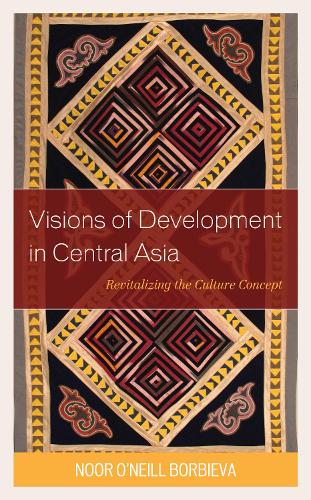
Visions of Development in Central Asia: Revitalizing the Culture Concept
(Hardback)
Available Formats
Publishing Details
Visions of Development in Central Asia: Revitalizing the Culture Concept
By (Author) Noor ONeill Borbieva
Bloomsbury Publishing PLC
Lexington Books
16th July 2019
United States
Classifications
Professional and Scholarly
Non Fiction
Social and cultural anthropology
306.095843
Physical Properties
Hardback
254
Width 161mm, Height 229mm, Spine 22mm
585g
Description
Visions of Development in Central Asia: Revitalizing the Culture Concept reflects on the current anthropologic methods of theorizing about culture. Noor O'Neill Borbieva focuses on the intellectually and politically problematic discourse of culture matters thinking, or CMT. CMT asserts that cultures are homogeneous and that the dominant values of a culture determine a states socioeconomic and political trajectories. Drawing on practice theory, ecological psychology, complexity science, and poststructuralism, Borbieva urges anthropologists to reconsider the culture concept in order to combat the impact of simplistic formulations such as CMT. Through an examination of ethnographic material from Kyrgyzstanand drawing on the many years she lived in the region, first as a Peace Corps Volunteer and later as an ethnographerBorbieva creates a clear picture of what is at stake if anthropologic debates about culture remain unchanged. She argues that such narratives not only misunderstand the cultural basis of human diversity, but also threaten that diversity by promoting a one-size-fits-all vision of well-being. Borbieva suggests an alternative vision, one that recognizes the profound complexity of human sociality and that embraces the many forms of human thriving that grow out of our cultural differences.
Reviews
Visions of Development in Central Asia assesses the realities of aid in Central Asia. It explores the relationship between culture and development as well as the interaction between the West and local cultures by applying various ideas regarding the social, political, and economic development in local conditionsin this case in Kyrgyzstan. The author's voice is a valuable contribution to the discussion of the perception of non-European cultures by scholars and development practitioners. It demonstrates how various theories of development determine the thinking of practitioners implementing development programs, affect the interaction between Western aid workers and local actors, and determine aid effectiveness. -- Anna Cielewska, Jagiellonian University
Author Bio
Noor ONeill Borbieva is associate professor of anthropology at Purdue University Fort Wayne.
